
Clannad are an Irish band formed in 1970 in Gweedore, County Donegal, by siblings Ciarán, Pól and Moya Ui Bhraonain and their twin uncles Noel and Pádraig O Dugain (Duggan). They have adopted various musical styles throughout their history. Beginning as an acoustic folk group mainly performing rearranged traditional Irish songs in Gaelic, they expanded their sound with original songs in English, vocal harmonies, electronic keyboards, and elements of rock, Celtic, new age, smooth jazz, and Gregorian chant.

The Devil's Own is a 1997 American action thriller film starring Harrison Ford and Brad Pitt, with Rubén Blades, Natascha McElhone, Julia Stiles, Margaret Colin, and Treat Williams in supporting roles. It was the final film directed by Alan J. Pakula, who died the next year, and the final film photographed by Gordon Willis, who retired soon after. The film was written by Vincent Patrick, David Aaron Cohen, and Kevin Jarre. The plot revolves around a member of the Provisional Irish Republican Army (Pitt) who comes to the United States to obtain black market anti-aircraft missiles to shoot down British helicopters in Northern Ireland. The plan is complicated by an Irish-American policeman (Ford), whom the IRA member has come to regard as family.

Martin Dillon is an Irish author, journalist, and broadcaster. He has won international acclaim for his investigative reporting and non-fiction works on The Troubles, including his bestselling trilogy, The Shankill Butchers, The Dirty War and God and the Gun, about the Northern Ireland conflict. The historian and scholar, Dr. Conor Cruise O'Brien, described him as "our Virgil to that Inferno". The Irish Times hailed him as "one of the most creative writers of our time".
Raymond Stanley Lonnen was an English stage and television actor. His most prominent roles include Willie Caine in the ITV cult classic Cold War-era spy drama series, The Sandbaggers (1978–80), and also as Harry Brown in the television miniseries Harry's Game (1982).
The Kingsmill massacre was a mass shooting that took place on 5 January 1976 near the village of Whitecross in south County Armagh, Northern Ireland. Gunmen stopped a minibus carrying eleven Protestant workmen, lined them up alongside it and shot them. Only one victim survived, despite having been shot 18 times. A Catholic man on the minibus was allowed to go free. A group calling itself the South Armagh Republican Action Force claimed responsibility. It said the shooting was retaliation for a string of attacks on Catholic civilians in the area by Loyalists, particularly the killing of six Catholics the night before. The Kingsmill massacre was the climax of a string of tit-for-tat killings in the area during the mid-1970s, and was one of the deadliest mass shootings of the Troubles.

"Theme from Harry's Game" is a 1982 song by Clannad commissioned as the theme for Harry's Game, a Yorkshire Television miniseries adapted from a 1975 novel set in The Troubles in Northern Ireland. It was released as a single in October 1982 and became a surprise hit, reaching number 5 in the UK Singles Chart the following month and number 2 in the Irish Singles Chart.
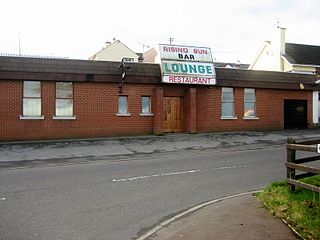
The Greysteel massacre was a mass shooting that took place on the evening of 30 October 1993 in Greysteel, County Londonderry, Northern Ireland. Members of the Ulster Defence Association (UDA), a loyalist paramilitary group, opened fire on civilians in a crowded pub during a Halloween party, killing eight and wounding nineteen. The pub was targeted because it was frequented by Catholics, though two of the victims were Protestant. The group claimed responsibility using their cover name "Ulster Freedom Fighters", saying the attack was revenge for the Shankill Road bombing by the Provisional IRA a week earlier. Four men were sentenced to life imprisonment for the massacre but were released in 2000 under the terms of the Good Friday Agreement.
Martin McGartland is a former British informer who infiltrated the Provisional Irish Republican Army (IRA) in 1989 to pass information to RUC Special Branch.

The Miami Showband killings was an attack on 31 July 1975 by the Ulster Volunteer Force (UVF), a loyalist paramilitary group. It took place on the A1 road at Buskhill in County Down, Northern Ireland. Five people were killed, including three members of The Miami Showband, who were one of Ireland's most popular cabaret bands.
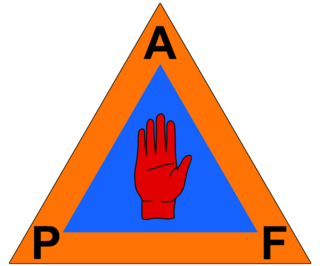
The Protestant Action Force (PAF) was a front group used by Ulster loyalist paramilitaries in Northern Ireland when claiming responsibility for a number of attacks during the Troubles. First used in 1974, attacks by individuals claiming to be members of the PAF killed at least 41 Catholic civilians. The PAF was most commonly used by members of the Ulster Volunteer Force (UVF). All of the attacks claimed by the PAF in Armagh and Tyrone counties from 1974 to 1976 have been linked to the Glenanne gang, which was a group consisting of members of the UVF Mid-Ulster Brigade along with rogue Ulster Defence Regiment (UDR) soldiers and Royal Ulster Constabulary (RUC) police officers. A six-year period of no attacks claimed by the PAF ended in 1982; during the 1980s, the PAF claimed 15 attacks in the Belfast area and two in County Armagh. UDR soldiers were convicted of two attacks in Armagh. The PAF claimed its last attacks in the early 1990s, all of which were in north Armagh and were alleged to involve members of the security forces.

The Springhill massacre was an incident in which five Catholic residents were killed by the British Army in the Springhill estate in West Belfast, Northern Ireland, on 9 July 1972, during the Troubles. Three of the victims were teenagers, including a 13-year-old girl, and another was a Catholic priest waving a white flag as he went to attend one of the injured.

The Glenanne gang or Glenanne group was a secret informal alliance of Ulster loyalists who carried out shooting and bombing attacks against Catholics and Irish nationalists in the 1970s, during the Troubles. Most of its attacks took place in the "murder triangle" area of counties Armagh and Tyrone in Northern Ireland. It also launched some attacks elsewhere in Northern Ireland and in the Republic of Ireland. The gang consisted of British soldiers from the Ulster Defence Regiment (UDR), police officers from the Royal Ulster Constabulary (RUC), and members of the Mid-Ulster Brigade of the Ulster Volunteer Force (UVF). Twenty-five British soldiers and police officers were named as purported members of the gang. Details about the group have come from many sources, including the affidavit of former member and RUC officer John Weir; statements by other former members; police, army and court documents; and ballistics evidence linking the same weapons to various attacks. Since 2003, the group's activities have also been investigated by the 2006 Cassel Report, and three reports commissioned by Irish Supreme Court Justice Henry Barron, known as the Barron Reports. A book focusing on the group's activities, Lethal Allies: British Collusion in Ireland, by Anne Cadwallader, was published in 2013. It drew on all the aforementioned sources, as well as Historical Enquiries Team investigations. The book was the basis for the 2019 documentary film Unquiet Graves, directed by Sean Murray.
UVF Mid-Ulster Brigade formed part of the loyalist paramilitary Ulster Volunteer Force in Northern Ireland. The brigade was established in Lurgan, County Armagh in 1972 by its first commander Billy Hanna. The unit operated mainly around the Lurgan and Portadown areas. Subsequent leaders of the brigade were Robin Jackson, known as "The Jackal", and Billy Wright. The Mid-Ulster Brigade carried out many attacks, mainly in Northern Ireland, especially in the South Armagh area, but it also extended its operational reach into the Republic of Ireland. Two of the most notorious attacks in the history of the Troubles were carried out by the Mid-Ulster Brigade: the 1974 Dublin and Monaghan bombings and the Miami Showband killings in 1975. Members of the Mid-Ulster Brigade were part of the Glenanne gang which the Pat Finucane Centre has since linked to at least 87 lethal attacks in the 1970s.
The 1991 Cappagh killings was a gun attack by the loyalist Ulster Volunteer Force (UVF) on 3 March 1991 in the village of Cappagh, County Tyrone, Northern Ireland. A unit of the UVF's Mid-Ulster Brigade drove to the staunchly republican village and shot dead three Provisional IRA members and a Catholic civilian at Boyle's Bar.
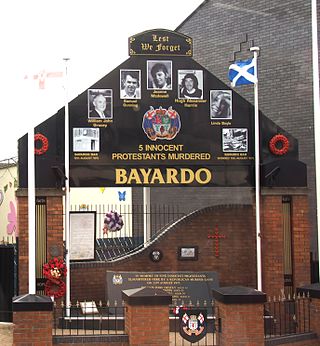
The Bayardo Bar attack took place on 13 August 1975 in Belfast, Northern Ireland. A unit of the Provisional Irish Republican Army (IRA), led by Brendan McFarlane, launched a bombing and shooting attack on a pub on Aberdeen Street, in the loyalist Shankill area. IRA members stated the pub was targeted because it was frequented by members of the Ulster Volunteer Force (UVF). Four Protestant civilians and one UVF member were killed, while more than fifty were injured.
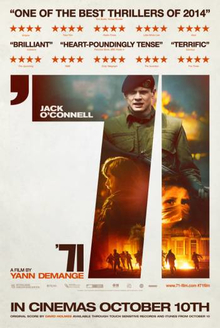
'71 is a 2014 British thriller film written by Gregory Burke and directed by Yann Demange. Set in Northern Ireland, it stars Jack O'Connell, Sean Harris, David Wilmot, Richard Dormer, Paul Anderson and Charlie Murphy, and tells the fictional story of a British soldier who becomes separated from his unit during a riot in Belfast at the height of the Troubles in 1971. Filming began on location in Blackburn, Lancashire, in April 2013 and continued in Sheffield, Leeds and Liverpool. The film was funded by the British Film Institute, Film4, Creative Scotland and Screen Yorkshire, and had its premiere in the competition section of the 64th Berlin International Film Festival, held in February 2014, where it was particularly praised for O'Connell's performance and Demange's direction.
The following is a timeline of events pertaining to the Troubles in Dublin, Republic of Ireland.
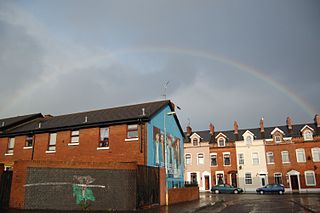
In the late hours of 3 February and the early hours of 4 February 1973, six men, all of whom were Catholics, were shot and killed in the New Lodge area of north Belfast:

The Irish National Liberation Army Belfast Brigade was the main brigade area of the Irish National Liberation Army (INLA). The other Brigade areas were in Derry which was split between two battalions, the first in Derry City, and the second battalion in south County Londonderry and County Armagh which was also split into two battalions, a south Armagh and a north Armagh battalion, with smaller units in Newry, east and west County Tyrone and south County Fermanagh.
This is a timeline of actions by the Official Irish Republican Army, an Irish republican & Marxist-Leninist paramilitary group. Most of these actions took place as part of a Guerrilla campaign against the British Army & Royal Ulster Constabulary and internal Irish Republican feuds with the Provisional IRA & Irish National Liberation Army from the early 1970s - to the mid-1970s during the most violent phase of "the Troubles" in Northern Ireland.













